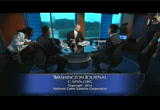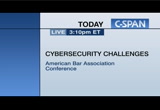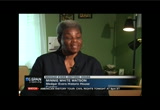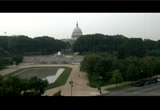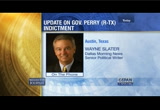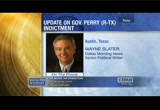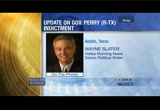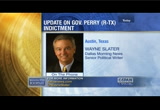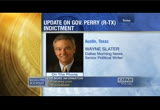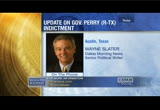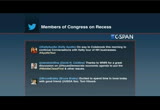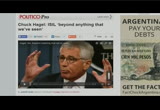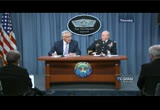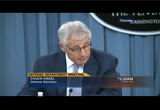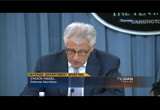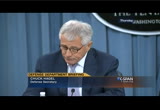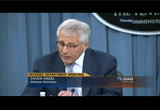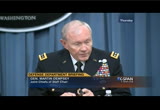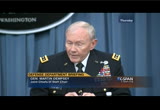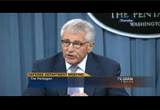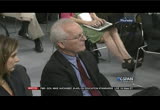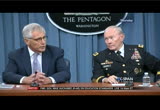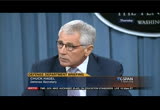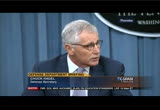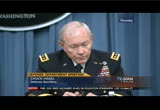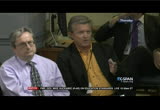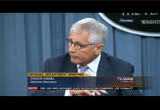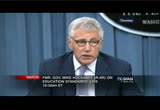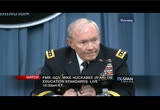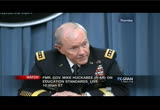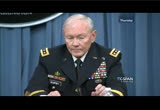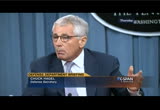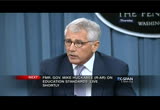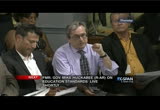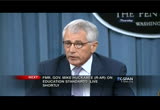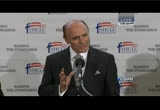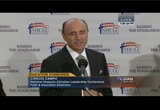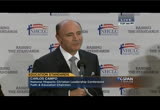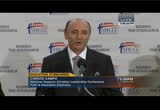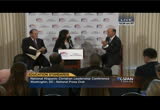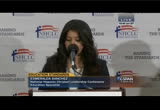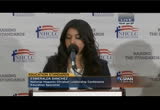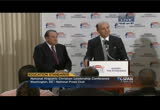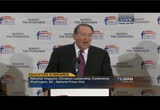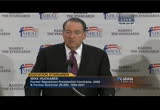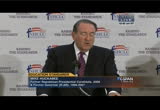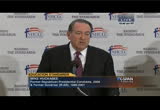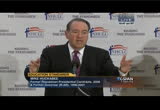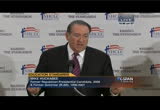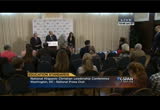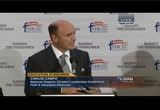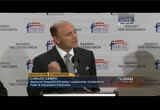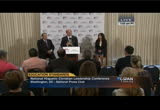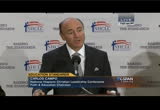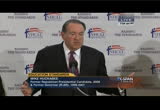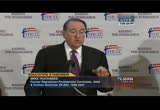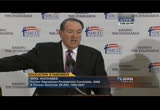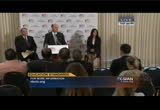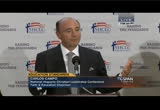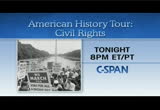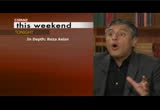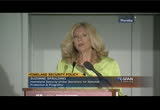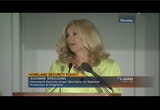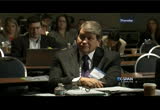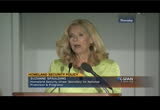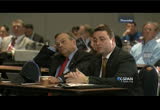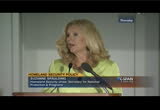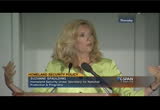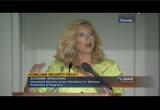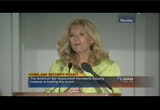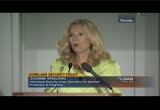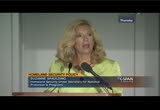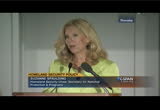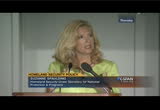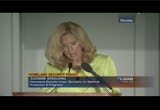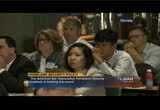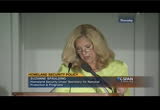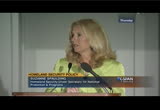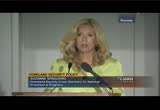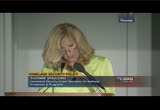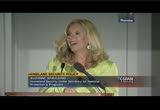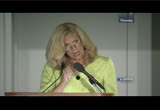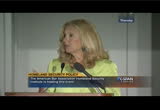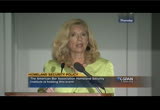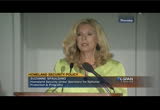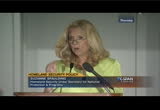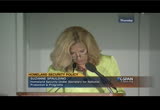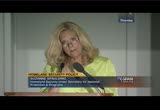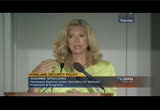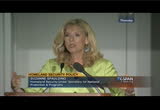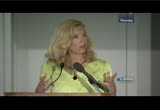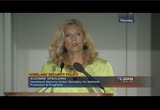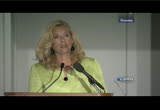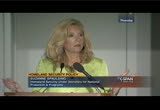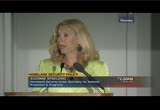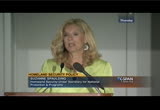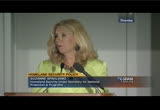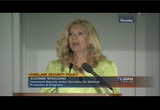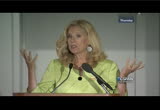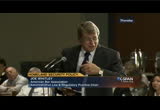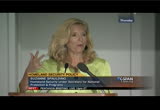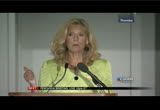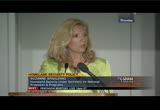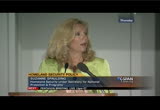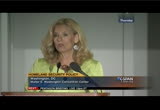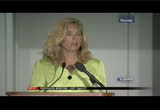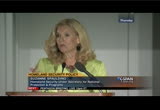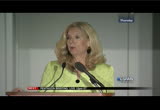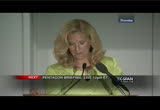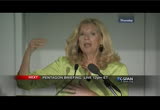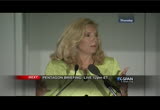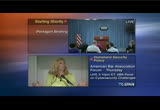tv Key Capitol Hill Hearings CSPAN August 22, 2014 10:00am-12:01pm EDT
10:00 am
we will see right here tomorrow morning at 7:00 a.m. eastern, 4:00 a.m. pacific. have a great friday. [captions copyright national cable satellite corp. 2014] [captioning performed by national captioning institute] >> thank you for joining us on this friday. governor mikes huckabee and the national -- former arkansas governor mike mike huckabee and the national hispanic christian leadership conference announced new initiatives in support of
10:01 am
higher u.s. education standards. public support for common core standards is dropping. live coverage begins at 10:30 eastern here on c-span. the american bar association continues its homeland security conference with a focus on cyber security. the government challenge and the dressing security breaches, this afternoon at 3:10 eastern. weh friday night this month, travel to historic places and we hear from authors that shaped the nation. tonight we focus on the civil rights movement and focus on the 1917 race, riot, and here at the civil right movements.
10:02 am
>> he witnessed a lynching when he was only 12. his father said that is what they do. so he said, i am sure he was a little bit angry and hurt. getting away from it, getting away from mississippi, he enlisted into the army when he was only 16. he said defending america doesn't matter about the color of your skin, until he came home to mississippi. he tried to register to vote. he and his brother charles. he said a group of white men turned them around with shotguns. dave ran and did not go against those men. >> the entire program on civil rights, a look at the letter from birmingham jail and the
10:03 am
16 street baptist church bombing coming up tonight at 8:00 eastern here on c-span. rick perry will be arraigned in texas on abuse of office charges. a computer talk this morning on "washington journal." me? you hear host: thank you for taking the call to talk about texas politics. we are talking about rick perry in an indictment. for people who are still coming to the story, can you explain what the indictment is about and what he is charged with? guest: he vetoed some money. taxpayer money goes to the travis county district attorney's office. the district attorney has been responsible for them
10:04 am
investigating public corruption. this is the agency that handles that and get some state money to supplement its touch it to handle it. the governor decided to veto money for this agency. he did it because the district year was arrested and convicted of drunk driving. he lost confidence and her and she did not deserve the state money. republicans have been after this agency for more than a decade. felt they feelm republicansdicted and democrats in the past.
10:05 am
money, aetoed the complaint was filed and a special prosecutor was named. rick perry was indicted for abusing his authority and folk version. he was charged with the towing toey using taxpayer money try to muscle a duly elected county official out of office regardless of what the voters in that county want to say. that hery's response is can fully -- fetal money. there is nothing wrong with anything that he did. he is being put on trial for political reasons. if you went to check that out, walk us through the mechanics of this.
10:06 am
many may have seen the mug shot that was released this week. what is next and how long will this trial be drawn up? guest: that is a good question. i have talked to his lawyers, he wants to move on this as quickly as possible. they want to resolve it. he is innocent and wants to be proven innocent. he is considering running for president in 2016. in iowat a good thing and south carolina and every news story has the word indictment next to your name, that is not ideal. his lawyers are expected to try to get the charges quashed. he is allowed constitutionally to exercise the right of a veto and if that doesn't work then ask for the summary judgment. judge we to say to the
10:07 am
all agree on the facts. he vetoed money. there was a right for him to veto money. the question is a matter of law. does that constitute legal -- illegal coercion. this is the way to explain that. it is legal to veto money or a bill. it is legal for someone to say i want someone else to leave office because i have lost confidence in them. it is another to link the two. this to summary judgment and the judge can throw this out, they can resolve this and a matter of just a few months. to goise, this is going for months and a well into next year before it could go to trial.
10:08 am
he is not likely to settle. the prosecution is not likely to drop the case. trial ford be on abuse of power and coercion at some point as early as next summer or next fall. earlierayed that clip from the heritage foundation. what did you make of him in that appearance? guest: he's done exactly -- we are talking politically -- he has to walk a legal route and is lawyers will figure out the legal theory. the other is a political route. he got out in front of the story and said this is politics. democrats in travis county are out to get me. it is unfair and it is not right. anybody can get an indictment.
10:09 am
i will be fully cleared. yesterday at the heritage foundation speech, he looked confident. he looked like a person who is ready to take on the world. saysw his political team not only say you're innocent but exude the confidence of a person who is innocent. to rallyts will be conservative republicans in places like iowa and new hampshire and south carolina who will see perry framing the messages. they think that is a very appealing political message as well as the obvious expression of innocence that he wants to project. host: wayne slater is a senior political writer for
10:10 am
>> governor perry's arraignment is today. there was a speech yesterday in washington. you can see that on sunday. congress remains on its summer break. members are tweeting out what they are up to. congressman said thanks to wnri for a great discussion on the agenda, putting the middle class first and other issues. bruce braley said excited to spend time in iowa with good friends and tom millsap. chuck hagel yesterday called the isis an imminent threat. well-funded and sophisticated.
10:12 am
>> good afternoon, everybody. as the u.s. central command continues to provide regular updates about our military support to iraq and kurdish forces, this afternoon, i want to say a few words about what this assistance has accomplished over the last two weeks and, based on the president's guidance, what we can expect going forward. chairman dempsey will give you a brief summary, including some numbers on the u.s. military actions to date. but first, let me offer my deepest condolences and sympathy to the family of jim foley. the american journalist who as you all know was savagely murdered by the isil. as the department of defense
10:13 am
confirmed yesterday, earlier this summer, the united states attempted a rescue of a number of american hostages held in syria, including jim foley. we all regret that mission did not succeed. but i am very proud of the u.s. forces that participated in it. and the united states will not relent our efforts to bring our citizens home and their captors to justice. jim foley's murder was another tragic demonstration of the ruthless, barbaric ideology -- through isil. isil militants continue to massacre and slay innocent people and persecute minority sunni, shia and kurdish populations. given the nature of the threat, at president obama's direction and at the request of the iraqi government, the u.s. military has provided assistance to iraqi security forces in order to
10:14 am
protect u.s. personnel and facilities. and support iraq's efforts to counter isil. american air strikes and american arms and assistance helped kurdish forces slow isil's advance. where american troops are working and help the iraqis take and hold mosul dam. a breach of the dam would've manytened the lifves of iraqis and prevented the iraqi government from writing critical services to its citizens. the united states led an international effort to address the humanitarian crisis that unfolded at mount sanchar. there continues to be an acute humanitarian need elsewhere in iraq. the u.s. appreciates the partnership of the u.k., canada, france and australia and the
10:15 am
united nations in helping to provide relief. i expect more nations to step forward with more assistance in the weeks ahead. overall, these operations have stalled isil's momentum and enabled kurdish and iraqi forces to regain their footing and to retake the initiative. as iraqi and kurdish forces continue to take the initiative, the united states will continue to support them. but addressing the threat posted -- posed by isil to the future of iraq requires political reform in iraq. the country's peaceful transition of power last week was important and the united states will continue urging iraq 's new prime minister to establish an inclusive government that is responsive to the needs of all of a rock --
10:16 am
iraq's citizens. a united iraq will be more secure and prosperous iraq. political reform will make it harder for isil to exploit sectarian divisions. the united states and international community will support iraq with clinical progress. the chairman and i are clear eyed about the challenges ahead. we are pursuing a long-term strategy against isil because isil clearly poses a long-term threat. we should expect isil to regroup and stage new offenses and the u.s. military's involvement is not over. president obama has been very clear on this point. our objectives are main clear -- to protect facilities, provide assistance to iraqi forces as they confront isil, and joined with international partners to address the humanitarian crisis. with that, i will ask chairman dempsey for his comments and then we will take questions. thank you. >> thank you, mr. secretary. as most of you know, i just returned on sunday from a trip
10:17 am
to vietnam. today, i have my counterpart from singapore visiting. on vietnam, it was quite remarkable to be in vietnam 40 years after our departure from vietnam. to discuss opportunities for new relationships, building on our historical investment and the incredible sacrifices of those who served there. my engagements in the region reinforce that we have our shoulder behind rebalance to the asia-pacific even as our military confronts challenges in other parts of the world. in fact, on sunday, i will depart for afghanistan. which brings me to iraq. under the command of general lloyd austin at u.s. central command, our efforts have included to date seven humanitarian airdrop missions delivering 636 doubles goals of food, water and medical supplies will stop more than 60 intelligence, surveillance and reconnaissance sorties each day
10:18 am
will stop -- each day. and targeted airstrikes conducted by air force and navy aircraft. these airstrikes have attempted -- have protected u.s. persons and facilities and help to prevent humanitarian crises. as iraq's future takes shape, i i answer -- i emphasize that an enduring stability will depend on creating a dependable partner in the iraqi government that must commit to be more inclusive with all of its population that has been thus far. with that, i am happy to take your questions. >> in your comments, you mentioned isil's momentum has been stalled recently but you expect them to regroup. the question is why not know after isil where they started, which is in syria? i know you described enabling the iraqis politically and militarily to roll back the
10:19 am
gains in iraq, but they do have a sanctuary in eastern syria. what is the strategy if it is not to go root them out inside syria? why not go that route? >> first, going back to your point about my statement on what our objectives are, which i just restated in my statement, i would also say in addition to that, i believe the president has been clear on this, that we continue to explore all options regarding isil and how best we can assist our partners in that area. the middle east, particularly in .raq against isis you all know in the president's request for a $5 billion antiterrorism fund, it was $500
10:20 am
million in there to assist the moderate opposition. so that is what we are looking at, that is what we are doing and we will continue to stay focused on what we are doing now and exploring all options. >> do the options you refer to include airstrikes? >> we are looking at all options. >> i wanted to ask both of you specifically on the hostage rescue mission. you have talked about protecting classified information. even if you were told the news media was going to publish an article, you repealed it because you thought the media is going to publish something. why specifically did both of you think it was a good idea to officially acknowledge in detail classified details about a mission omission, that is a
10:21 am
hostage rescue when there are still americans there? are you worried that this will risk other hostages' lives? why did you both think it was a good idea to do this? no one has seen you do this before. >> why did we think it was a good idea to? >> publicly acknowledge a classified mission for a hostage rescue. >> to start with, there were a number of news outlets that were aware of the action. of the raid. and it was a decision made by the administration. we concurred with that, to address the mission, recognizing everything that you said, there is always risk, there continues
10:22 am
to be risk in every action or inaction we take. also, the administration had informed the families of the hostages of this effort. so it was a decision and it was unanimous that we should in fact acknowledge this effort without going into any of the specifics of it, which as you know, we will not as to your question as to whether this was a failure of intelligence, no. the fact is you all know intelligence does not come wrapped in a package with a bow. it is a mosaic of many pictures of many factors. the enemy always has a say in everything. the fact is, you have to work
10:23 am
that reality in to any decision you make, but the underlying objective was to do everything we could as the president has said to rescue these hostages, knowing their lives were in danger. clearly in danger. it's the responsibility of our government and our leaders to do all we can to take action when we believe there might be a good chance to make a rescue effort successful. this operation, by the way, was a flawless operation. but the hostages were not there. so we will do everything we need to do, that the american people would expect from their leaders, to continue to do everything we can to get our hostages back. hostages think -- the
10:24 am
are at risk? the news media was going to write an article about this and do you believe it was an intelligence failure? >> the military advice that was rendered in response to your question was as long as sources and methods are not revealed, it would be a policy decision on whether to release the information on the raid. as to whether it was an intelligence failure i agree with the secretary of defense, the mission was executed flawlessly after a significant time of signing, preparation and rehearsal. and it turned out the hostages were no longer at that location. >> you believe they were there at one point? >> i do. >> could you both talk about the long-term strategy against isis?
10:25 am
secretary of state john kerry said they will be crushed. the president calls it may -- calls them a cancer. if that is the case, why are u.s. airstrike so focused and limited? it seems the rhetoric doesn't match u.s. efforts. >> well, first of all, we are providing a tremendous amount of military assistance to the iraqi military forces. it is one country. there is no question we have accelerated. all year long, we have been accelerated, all of the requests made by the iraqi government for lethal assistance, and we continue to do this. as to the comments made by secretary kenny and the theident and we all share
10:26 am
l, secretary kerry has said, the defeat of isil is not only going to come at the hands of airstrikes will stop -- an inclusive government in iraq is essential. as to how all of our international partners are going to have to deal with the action, airstrikes are part of that stop . it is bigger than just a military operation. our efforts as we executed the president's strategy on this are specifically targeted for the reasons he said. but we are working with international orders. we are working closely with the
10:27 am
-- we are doing everything we can within the confines of our influence to recognize and deal with isil in the middle east and also recognizing it is a threat. isn't just going to come as a result of airstrikes. strategically, there are limits to how much you can accomplish with airstrikes. tactically you could accomplish a significant amount. i mentioned that in my comments. it is a broad scope of activities and actions. >> have not received the heavy weapons they requested. >> a task force for the equipping effort with the kurds, yes. the secretary has a task force that overseas that and i have seen some supplies from the government of iraq, which is not
10:28 am
to be discounted as a significant moment with the possibility that there won't be a single state of iraq in the future. those conducting assessments in joint operating centers have continued to evolve. this is not just about airstrikes. >> do you believe isis can be defeated or destroyed without addressing the cross-border threat from syria and is it possible to contain them? >> let me start from where you ended and end up where you started. it is possible to contain them. and i think we have seen their momentum was disrupted and that is not to be discounted, by the way because it was the momentum that have allowed them to find a way to encourage the sunni population of western iraq, to accept their brutal tactics and
10:29 am
presence among them. the answer is they can be contained, not in perpetuity. this is an organization that has an apocalyptic, end of days strategic vision that will eventually have to be defeated full up to your question, can they be seated without addressing that part of the organization that resides in syria, the answer is no. that will have to be addressed on both sides of what is at this time a nonexistent border. that will come when we have a coalition in the region that takes on the task of defeating isis over time. they will only truly be defeated when it is rejected by the 20 million disenfranchised sunni that happen to reside between damascus and baghdad. it requires a variety of instruments, only one small part of which is airstrikes.
10:30 am
10:31 am
i think it is well documented as to why. brutalu have the dictatorship of assad and what he has done to his own country, which perpetuated much of what is happening and has been happening in syria. he is part of the problem. he is the central core of it. as tear question about isis and assad, they are fighting each other as well as other terrorist , very sophisticated terrorist groups in syria. he is absolutely part of the problem. beyond humanitarian and protecting americans to directly
10:32 am
does theer isis, pentagon believe it has the authority to talk to the general counsel about what you're doing now? is there a different type of authority you need going forward? has been verynt clear on a mission creep. he's made it very clear that he will not allow that. i this is why he is been very clear on what the mission is. we complied it with the war powers act. we informed congress on how many people we have. we consult with our counsel all the time and do we have the domestic authority in international authority on all actions.
10:33 am
i refer you back to the president's comments on a mission creep. this is not about mission creep. should the american public be ready for another long hard slog against isis? you painted them as an eminent threat. you talked about defeating them over time. should the public start getting prepared for another hard slog like secretary rumsfeld talked about fighting al qaeda? >> i think evidence is pretty clear. when you look to what they did to mr. foley, with a threaten to do. what they threaten to do to all americans and europeans.
10:34 am
.hat they are doing now i don't know any other way to describe it then barbaric. have no standard. they have no standard of decency. they have no responsible human behavior. i think the record is pretty clear that. they are an eminent threat to every interest we have, in iraq or anywhere else. about therd me speak fact that -- >> we will leave this briefing from yesterday. this is just getting underway. we have labor day looming. it is not the start of arkansas football. ago, i would be standing in front of a group of
10:35 am
students teaching them english. there are a couple of trends that impact of the classroom then that are relevant to our discussion now as well. i noticed students come into the classroom are part of what was later dubbed the browning of america. skin.ad beautiful i noticed another trend. this is much more disturbing. the students were not prepared for what i was attempting to teach them. they had come to the classroom less and less prepared. in theere these moments classroom they would look at me and i would think the same thing they were. christian, i a felt the lord was impressing on me.
10:36 am
these are your children. if they are going to love me with their mind, it is your responsibility make sure that they are successful. that is the spirit and the heart of what raising the standards is about. that is the initiative we're here to talk about. we believe it is raising the standards as one of a initiative that can help not just those students but those of the coming today and tomorrow. years, at-forward 15 collective minority will be larger than the white population in classrooms today. this is the first time in u.s. history. we have seen some progress among hispanic students in terms of high school graduation. in terms of college going.
10:37 am
the second half of that story isn't so terrific. they're not completing college at the same rate. it is 50% lower than their white counterparts. we believe that today is a day of action. we're are here to announce an initiative that will. educational hispanic sunday. september wey in lift up education and pulpits across the country. some of the pastors represented here today will be tearing down these false walls of separated faith and education for too long. raising new rigorous standards in our homes and schools and say no longer will we dumb down standards and socially promote students of any background. we will hold all students accountable.
10:38 am
pastors and principles should meet. parents and professors should meet. we no longer have a false dichotomy that keep us apart. we believe that in addition to that we have started a faith and education website. we are going to send hispanic parents to get resources to assist their children and assist them to be more successful. these are all part of raising the standards initiatives. the next person of the podium embodies what happens when we expect more. we hear about an achievement gap for hispanic and other minority students. we don't think that is accurate. we think it is an opportunity gap.
10:39 am
as someone who works for the nhs clc, her story and her confidence as a young woman success story will be inspiring. [applause] >> good morning. ofa daughter first-generation generation immigrants, my education was a high priority. their understanding of the language and the system was limited. they prayed for and dream for the same things for me that my schoolmates has one of their children. a good education, strong faith, solid family values and a future of opportunity in this great nation they called home. dallas where ethnic diversity was the norm that high educational standards in neighborhood schools were not. gets with you to apply and
10:40 am
accepted to a magnet high school. it expected us to graduate not just from high school from college as well. my friends and extended family at the high school in the neighborhood were not so fortunate. they were not held to rigorous academic standards and were not prepared for college-level work. thanks to the high expectations of my parents and teachers, i was motivated and prepared to earn a bachelors degree and then a masters degree. today, i work here on national education initiatives. next year, i will answer the program. that highg proof educational expectations and family support empower students from the most this vintage
10:41 am
neighborhoods to not just graduate, but to impact the next generation. as the fastest-growing segment in schools, we must seize the opportunity set high goals. they are a national resource and national treasure with the potential to lead americans to discovery and creativity. nhclcic students and the welcome the support of national leaders committing to raise her in the standards for public education. hispanicsure that families are encouraged to pursue the american dream of freedom, opportunity, and a better life for their children. thank you. [applause] >> she inspires me with that every time. our featured speaker today we are blessed to have.
10:42 am
he has a record for educational reform and supporting my nordic students as the former governor of arkansas. this is a man who also has a background in the church and understands the intersection of faith and education. he understands this intersection between common sense and conservatism from our perspective. the leading voices for conservatives and christians. please help me welcome governor mike huckabee. [applause] thank you. so you're looking at the scene and saying what is wrong with this picture. you have two hispanic leaders and eight obvious white guy in the middle. i care because america is a better country when all of its children are well-educated.
10:43 am
when every student in this country has equal access to an excellent education and there is no such thing as a student who is required or somehow destined to go to an underperforming school. that should not be tolerated. it does not matter if ace to do is black, white, brown. it matters not. there is no such thing as a disposable child. country isnt in this an integral part of making us everything we can be. is reason i stand here today raising academic standards is not simply the role of the school and it is certainly not the role of the government. not dry-cleaning. parents can drop them off of the morning and pick them up in the afternoon spot free.
10:44 am
what we have to do is remind parents that it is a biblical mandate for the parents to raise the children. they need to accept the responsibility for the outcome of their students. it goes back to the proverbs. train up a child in the way that he should go and he will not depart from it. it is as fundamental as life itself. it it was never acceptable for us to say we will give the responsibility of the education to the government and hope for the best. it will not end well. it does not matter who a person may be. 40,000he leadership of hispanic churches across the country who decided that on education sunday they are going to use the power of their pulpits talking to millions of their constituents and remind them of their pivotal
10:45 am
responsibility to take charge of the educational opportunities for their children. wonderful opportunity for america. if we turn this over to congress , their approval rating is 9%. we want to turn it over to the government. we don't see the government top really doing a great deal. it would be against our own biblical convictions to ever turn over to caesar that which is god's. part of the challenge to the is that they will remind the parents that it is your responsibility to make sure that they are getting the best education they are able to
10:46 am
receive. if that means they can't get into the school they are assigned to, they need to push for school choice. homeschool or to whatever decision is best for the student. education decisions ought to be about what is best for the student and not best for the government or the tax base or the people who are running the schools. i had a department of education director that was a real partner in reform. we work hard in our own state. one of the things we used to say it was there are two kinds of people, school people and their arcade people. school people are about the institution. that is not why we are there. it is about the children. we need to be kid people and focused on how the students are being prepared for life. i just want to mention that if we even thought tv time for parents to challenge your
10:47 am
students and challenge yourself. we could not be as effective as to see these pastors go into 40,000 churches. they will reach more people that sunday than on any television show we could buy time on. there would be more people .itting in those pews imagine what happens when they heed that message. that is why i salute the leaders who will be joining together on that momentous day. i really believe that from my time when i was chairman of the the onen commission, organization that brings together all of the major
10:48 am
players in state policy. a study discovered that the most important predictors of academic achievement outcome is every student would be exposed to a broad and challenging curriculum. i we cannot accept anything less than a very widespread curricula touches all of the talents of every student and one that challenges them to be their very best. it refuses to accept anything less than high standards for excellence. we are delighted to be here. i am thrilled to be part of the event. i believe we will entertain some questions. [applause] thank you, governor.
10:49 am
we have times for a few questions. hi. i want to differentiate between what is new and what you have done before. there are a couple of new initiatives. we are asking churches to take a love offering for every child that will be baptized or christened and deliver to them a college scholarship. for $25.be set up it doesn't have to be something huge. aery child to be present with bible and a college scholarship. this parallelt between faith and education is widening. it should be an intersection. be the quick one would
10:50 am
report card prayer initiative. we are asking parents to make copies of their report cards and turn them in the offering goes around. we believe those are offerings. we want the congregation to pray over them and children see this intersection of faith and study. we will have educational liaisons that help churches and parents improve the educational success of their students. they can be contacted. it is a strategic move on our part. those are a couple of new initiatives. the faith and education education -- website is new. emphasizing that we are not pushing public education away any longer.
10:51 am
we are supporting it. this is the first time in the history of evangelicalism that we are not embracing secularism if it exists, 95% of our students are educated in public schools. this is our system. we want to embrace public education and let them know that we are here to support you. how can we help? can pastors offer their churches for afterschool programs? thank you for the question. thank you. i am caitlin from politico. huckabee is in some poorly common core. i am wondering if you're still behind the common core?
10:52 am
howdy raise standards in schools? -- how do you raise standards in schools? >> raising the standards is about having standards like the common core standards state to state. we know the implications of a student in chicago being raised in a home and then going to a school where the standards are different or lower than they would be elsewhere. we believe that while there is a -- of political politicization of common core, go to the standards. have you read the standards? don't read the political things. go to the standards themselves. how can knowing how to round numbers off or understanding: no meals, how can it be political? that is a standard that every
10:53 am
third-grade student should know. we believe they are redeemable. we think that is the core of what it is all about. we believe that as a state led initiative. states like connecticut are represented here today. states will join this. graduate from my english class, i am not going to change the standards for any other motive because i care about you. i'm not going to speak for the governor, these are redeemable behind highs standards. salute the efforts in the college scholarships in the churches for every baptism and christening. i don't like the idea turning in the report cards.
10:54 am
i am thinking back to my own student days. i want to address the common core question. i think it has become toxic and radioactive. it is a controversial topic on both the left and right. disregard orl repulsion from people on the left and right when it comes to common core. i don't want to fight over program. i want to fight for students. the fight is not about what it is called. it is making sure that we elevate to the highest level challenging academic standards for students. to dividegoing ourselves over common core, let's stop that. let's not stop the fight whether we you are on the right or left for saying we want our students to achieve to the highest level they're capable of. they can't do that if we dumb
10:55 am
down the schools. i don't know any conservative who wants to dumb down america schools. if a student moves, the expectations of what they are going to experience academically in one state is comparable to the other. --is no different than would when we play basketball. if you are playing in california and then play a team in kentucky, a kentucky team will probably beat you. you want to make sure the goal is still 10 feet off the floor and the ball is inflated to the dimensions of the the court of the same. let's say in california lower the goal down to six feet and make sure everybody can
10:56 am
slamdunk the ball, have they created a better team? they have artificially lowered standards to make it appear they are successful. toant those kids to be able succeed in any state. had their be so far board or so far behind that they give up and quit because they can't catch up. that is what i will fight for. i'm not going to fight over program that has so many sticky notes put all over it about things or never a part of common core which is a very simple thing you. the controversies over data collection and curriculum and specifics. stop the fight. let's not make this something we are going to shed blood for no particular value to the students.
10:57 am
the students first. we have time for one more question. make it good. i am jeffrey scott with the christian post. there plans in the initiative to ramp up scholarships for hispanic students who are already in school but they might be dropping out because they can afford tuition? are there any plans to ramp up scholarships in that way? work with our to academic partners to make scholarships available. if that is part of it. that is only one piece. our hope is that these educational liaisons will help fill in some of those gaps as well.
10:58 am
financial difficulties are important part of the entire holistic approach to education. most research indicates there are other factors bring students down and make them drop out. remediation is not the least. we know it helps prepare those students for college life and the rigors of college education. i can't tell you how many students i knew personally that felt they are taking these classes and paying for them but i get no credit. before long they become a statistic. any remediation and america is a huge goal. thank you all. we appreciate your time and being with us. we will follow-up with many of you as this initiative is just taking off. thank you so much. thank you. [applause]
10:59 am
>> each friday night, american history tour travels the country to explore the historic laces and hear from office about some of the events and people that shaped the nation. theght we will focus on civil rights movement and focus on medicare evers. -- medicare evers. hear the curator talk about the civil rights movement. he asked his father why would they do that to him, his father said that is what they do. he was a little bit angry and frustrated and was hurt. it, he servedrom
11:00 am
in world war ii. he said itled about did not matter about the color of his skin until he came back home to mississippi. he tried to he and his brother charles and other veterans, he said a white man turned them around with shotguns. we ran. we did not go up against those men. entire program on civil rights, including this interview, a look at martin luther king's letter from a birmingham jail, and the 1963 bombing of the 16th street baptist church which resulted in the death of four african-american girls. highlightsme of the for this weekend. tonight on c-span in prime time,
11:01 am
we will visit important sites in the civil rights movement. saturday night at 8:00 comment new york ideas forum. on sunday, q&a with charlie wrangle. , inght at 8:00 on c-span2 depth with reza aslan. 10:00 p.m., after words with ben carson. c-span3,history tv on tonight at 8:00 eastern, a look at hollywood's portrayal of slavery. night at 8:00, the 200th anniversary of the battle of bladensburg. find out television schedule one week in advance at www.c-span.org and let us know
11:02 am
what you think about the programs you're watching. call us at the number on your screen or e-mail us. c-span conversation. like us on facebook, follow us on twitter. the american bar association held its ninth annual homeland security law institute yesterday in washington. homeland security undersecretary for national protection susan spalding discuss the challenges in securing the safety of the nation. [applause] >> tank you very much, joe, in putting together this very important conference.
11:03 am
to all of you, who are here today, who have taken the time to be here but who also -- i know on a daily basis -- care about and in many cases work to achieve our shared secure,e of ensuring safe, resilient communities where our ways of life can thrive. dans really like sutherland, who is my counsel, said -- this is like a class reunion. former dhs folks here, a lot of current dhs folks here. a lot of you in private practice and in i did emea and elsewhere, to thewhom contribute solving, dressing, understanding the challenges we face. tank you, all of you, for what you do. i bring greetings from secretary jeh johnson. beenuld have loved to have
11:04 am
here today. like me, he is a recovering are deeplynd we aware and appreciate the importance of the rule of law and the rule of lawyers as a as we got of our team forward to accomplish this mission on behalf of the american people. ableaided by my very counsel, dan sutherland, and the secretary has a wonderful general counsel in dan's boss, who i believe you're hearing from later in the program trade -- program. >> i want to talk about three
11:05 am
key elements of how we view our mission at the department of homeland security, particularly for the national programs director, for whom i have the honor of being the undersecretary. the name itself tells you very little about what we do. our overarching mission is to strengthen the security and resilience of the nation's critical infrastructure. in the context of an all hazards approach. he look at the threats, vulnerabilities, threats, and mitigation across physical, human, and cyber. we are working very hard each and every day to make sure that we are not still piping our approach to that mission of the security and resilience of that ourinfrastructure cyber ninjas who are really smart on the cyber front and the
11:06 am
folks who have gotten really good over the years that had understanding, cascading, consequences and injured -- interdependencies of the physical world, and the folks who are looking at human sick -- side,ty from a biometrics are understanding their own interdependencies. we are able to achieve that and get better and better at that each day, because we have very talented people at the department of homeland security. i will talk a little bit about that. i might talk a little bit about the role of technology, and that and aticularly important challenge on the legal front. for those of you in this room, i think you will -- i think some of the challenges i want to talk about their will resonate with you. one of the most important aspects of what we do, the public-private partnerships. that phrase has been with us for at least a couple decades now in
11:07 am
this context. a lot of people roll their eyes and have refused to even mention the phrase anymore. it is a reality that we benefit from every day. myill start by talking about favorite aspect of this, which is the talented people we have working for us. we have always had the benefit of being led by people with extraordinary talent. i continue to be amazed by the extraordinary talents of the people we are able to attract at the department of homeland security. a lot of that is due to the people in this room who were there at the creation of the department, and folks who have helped shepherd it along the way, who have made this an exciting place for people to come to work. we are very fortunate to be led by secretary jeh johnson who in addition to being a lawyer, most
11:08 am
recently came to us after having been general counsel at the department of defense during a brings not only the experience he had in private practice representing businesses, private sector, entities of all sizes, which is a critical part of what we do, but he also has brought to the department that post-goldwater nichols sense of unity. those of you with experience in d.o.d. who have been watching this know that about 40 years after the department of defense thecreated, congress passed 1986 goldwater-nichols legislation to bring greater unity of effort to the department of defense. as a talk about this to my colleagues at dhs, i remind them that it took about 40 years for the department of defense to get where they needed to get to begin on unity of effort. we do not have the 40 years to get this right at department of homeland security.
11:09 am
it helps you to keep in mind how young we are as a department. but secretary johnson has come with a sense of urgency to bring the lessons learned from the department of defense with regard to bringing that unity of effort across those elements of dhs. a very important part of what he is doing. and it is perfectly consistent with what i have been doing, trying to do, since i came in october of 2011, to bring that unity of effort i talked earlier about to make sure that our folks are fully leveraging data, resources, capabilities, understanding, knowledge across this elements and that we are happy for the secretary to leverage that across the department. -- helping the secretary to leverage that across the
11:10 am
department. we are fortunate with regard to our deputy secretary who was a component head, the head of citizenship and immigration services, has moved up to be the deputy, and i have to tell you it really is wonderful to have someone in that position who has led one of the components of the department and understands that relationship and how important that is between the department of homeland security headquarters and its operational components, and really captivates the kinds of things that need to be pulled up and centralized and managed from headquarters and those things that really need to be distributed out to the components.
11:11 am
it is interesting as i watch that because it is the same sort of lessons that i take back as i look at the relationship of the what i am, which is headquarters, and our component, and have the same kind of discussions about what needs to be centralized and distributed to create an effective, dynamic and efficient organization. so that is happening, so we are seeing changes at the departmental level in an effort to create a unity of effort to enhance efficiency and at the same time i'm doing this same change. the challenge we are facing is to make sure we are in sync with each other. so far we're doing pretty well. it is in large part thanks to the great leadership we have at the department. we were incredibly fortunate and excited to recruit our cyber under-secretary some months ago. she no longer can use the i-am-new-here card, but she has
11:12 am
been outstanding and for those of you who do not know phyllis, she comes to us from the private sector. she was the chief technology officer at mcafee. she's somebody who comes with an understanding already of the importance of policy because she was chair of the board at infraguard, a private group managed by the fbi, and with the perfect frantic analysis ever up analysis in pennsylvania, outside of carnegie mellon, the center for technology and analysis, i think it is called. she has been in touch with a lot of people on the hill. she has hit the ground running for us on the cyber front. she also helped us to recruit for our assistant secretary for cyber security and communications, a ph.d. in
11:13 am
computer science, and an understanding of the agency. prior to joining us, he was at the white house. he has come in and provided some outstanding leadership along with his deputies. we have an outstanding team in working on these cyber issues for us. they continue to attract the best and the brightest. we have a turnover which is to be expected. when you are recruiting really top talent, particularly in the cyber crime context. it is not surprising that the private sector might be able to lure some of them away. it is always a loss and we are always sad to see them go. we lost a couple of our key leaders. the head of our outreach and education program.
11:14 am
we know that we have top talent lined up, ready to come in and join the fight. that is really a wonderful feeling, to know that we will continue to be able to recruit the best and the brightest to come and join us on this really important mission. we have great leadership and i quickly want to highlight patterson. he leads our service. they are in charge of security, over 9000 facilities across the country. they do work very similar to what our protective security advisers and our detection doing in the private sector.
11:15 am
they also manage a private force that stands guard at those buildings. the insights we can get from that, day-to-day interactions. it is something that we are working to bring back in, again get out to the private sector to help enhance the work we do for the private sector. our federal protective service folks are increasingly aware of the interaction with cyber and physical. so, our cyber folks have responsibility for the gov. -- .gov. we lead the civilian.gov effort of cyber security. again, one of the things we're doing is saying, this is a real powerful combination. we have asset systems and
11:16 am
network. we are increasingly looking at that in a holistic way, how can we leverage those authorities? we bring the powerful combination to there. -- to bear. to be able to bring the knowledge in, whether it is from what we are seeing and what we are seeing at our tools and programs from what we're seeing in the physical realm together to provide those insights to our .com stakeholders. so, that issue and insight into what we are talking about unity,
11:17 am
that is the kind of thing we are talking about. how do we bring all of these things together to help all of our stakeholders by leveraging more fully the kinds of things we are doing. eric patterson is doing a great job leading the protective service. we have great leadership in our office of biometrics and identity management. they are taking a leadership role to look across the department to see how we can better leverage biometrics. the office of cyber security and infrastructure analysis which is a real institutionalization of that looking across cyber and physical. and that group is doing rate -- great work bringing together our cyber ninjas, particularly
11:18 am
those that have unequaled expertise in understanding industrial console systems. together with the people that can say so what. so, our industrial console systems can say, this is the way that somebody could hack into our systems and industrial control systems, here is what you can do with equipment processes that are controlled by those systems. the folks who understand how to model and understand those interdependencies come in and say, here the consequences. that is a critical part of prioritization. for all of us understand that we have limited resources and limited time. particularly in the case of an incident or a crisis. whether it is superstorm sandy or a cyber attack.
11:19 am
something that is on the scale that they are worried about. it is going to demand prioritization and understanding where you can keep generators going. in superstorm sandy, there is a communications hub that people are not paying attention to. if it is running out of fuel and its generators, up and down the eastern seaboard. we have got to get fuel, a generator. that is the kind of dynamic prioritization that our folks of the office of cyber analysis do during a crisis. the growing expertise is
11:20 am
actually increasingly being recognized by outside observers. for example, i mentioned two of our outstanding women in cyber security and communication. they were recently recognized as two of the top 50 professionals in government. my colleagues have won major awards from organizations such as the government technology research alliance and the security education. phyllis has been leased to gain an understanding about the wonderful expertise and the talent that we have in government. she came from the private sector and has professed that there was a lot of talk about the private sector had better talent than the government. and she had said time and time again that she had never worked with smarter, more professional people then she has here. we recently got kudos from our
11:21 am
stakeholders out there, from a company that we had sent one of our teams out to assist who wrote back and said that he had never worked with a more professional and talented team that had come out. so, those are nice things to hear, particularly for a nice organization that is still building and growing. -- young organization that is still building and growing. for those of you who have been with the department, i just wanted to really emphasize that how proud you should feel that that you helped to stand up. the second point that i want to talk about is the role of technology. we are particularly at risk.
11:22 am
11:23 am
this is the destructive intent. this is capacity. the line is like this. they would have the greatest destructive intent and have less capability. this top point is everyday moving to the right. those who have less capacity today are constantly gaining capacity. this bottom point depends on what is happening in the world. at any point, it could slip up. that is the threat picture, it is very dynamic and we are aware that it is very dynamic. a lot of that is because of technology. the good news again is that just
11:24 am
as our adversaries are dealing with advances and taking advantage of advances in technology, the department is looking at and making great strides in terms of the type of technology. science and technology directors had very innovative programs underway. those of you who are familiar with the metcalf incident at the electricity substation in california understand the importance of transformers and that they are a long pole in the tent. our science and technology director has been working with their private sector colleague to develop transformers that can be produced much more quickly and transported much more easily. that is a really important effort that they have underway.
11:25 am
that is a significant vulnerability. our colleagues who are also involved in our cyber activities and do terrific work on forensics and to uncover and prosecute kernel activity online. they are constantly innovating and using technology to get faster and better at the ways in which they are able to do that forensic activity. secret service is crippling international cyber crime. becoming increasingly innovative not only in the ways in which they do prosecution but also really working hard and one up their sleeves to see how they can carry out a successful prosecution while
11:26 am
sharing information without -- with us to share to our stakeholders as quickly as possible to prevent further activity. the secret service and the fbi are working hard. we have terrific stuff going on in our cyber center. the national communications and cyber security integration service, it is 24/7 center. it has on the floor of that center, not only our colleagues across the dhs but also our colleagues across the interagency including law enforcement and the intelligence committee. our colleagues come together and with increasingly sophisticated technology and tools that our colleagues come together and with increasingly sophisticated technology and tools.
11:27 am
also, understanding how to detect and stop and block those intrusions. they do this with their colleagues who are developing the tools. we have deployed our intrusion detection and are working on deployment of our intrusion prevention technology, also the diagnostics and monitoring which is going to revolutionize the way in which we assess the health of our government networks. right now i'm a under the fisma, this produces the client checklist. what cdm will do is within a matter of hours scanning your network, assess your network
11:28 am
and help you prioritize. being it is really truly remarkable. an example of the ways in which the department is taking advantage of technology to try to stay ahead of the game. this is an illustration of what i will talk about in a minute in terms of public-private partnership. they have responded to nearly half a million incident reports and they have put out over 26,000 actionable alerts. i will tell you that these are making a difference. we just got word from our private sector company that they had gone on alert.
11:29 am
some of the information came from the u.s. secret service. we put that information out. this got that alert about a possible malware, and they said to their tech folks, we have got to figure it out. they went and looked and indeed they did. they had a problem which they were able to identify and begin immediately to take mitigation measures for that. and that is exactly what we are about. we are all about giving that -- getting that information out, making sure it is actionable and trying to prevent and mitigate the consequences of cyber and physical intrusions. technology is impacting the laws as i referred to earlier. as you can imagine, dan and his team are dealing with a number of really cutting edge issues in the long.
11:30 am
-- law. a number of them have to do with technology and you all understand this. there is a disconnect between the incredibly rapid pace of technological change and the intentionally deliberate speed with which the law changes. the law is intended to be thoughtful, careful, buildout over time. whether you are talking about the development of law through the judicial process which can take a long time or developments of loss to the congress which can sometimes take forever. and which is often runs the risk of being outdated as soon as it is enacted, so this is a huge
11:31 am
challenge, it is one with which we wrestle and what you wind up doing is you're going to laws for legal guidance that were written that the not actually envision perhaps the technological content in which you currently find yourself. so, it takes creative lawyers and his team to make sure that we are staying true to the public policy interests that lie behind those legislative enactments. you are familiar with the number of the questions and the areas at which this takes place. i reference that, that is one of the issues. the the issues. and and is -- that is, steve. speed. is, quantity is one of the issues that we are continually seen. it becomes a difference in kind. the amount of information that technology allows us not only to
11:32 am
gather but to understand and make sense out. it is both the sensing and the sense making part of technology. this has presented some interesting new issues for our court and lawyers. the boundaries that we conveniently as lawyers have put these issues, whether it is breaking things down our international, foreign and domestic, between nationstate actors and nonstate actors. between criminal actors and nationstate actors. these lines have served us pretty well. how this will be implemented and exactly how the fourth amendment applies etc.. those things are being challenged.
11:33 am
that debate and questions are being asked. do we need new kinds of buckets? had we make sure that our legal framework is keeping up with the changes in the world? we're the ones we deal with on a daily basis and that our roles, particularly the role of the government and the role of the private sector. those of you who came up in the traditional national security world, you will remember that we basically had, we interacted with the private sector are. it was generally in one of two contexts. they were either a contractor or they were a potential victim about whom you had specific
11:34 am
threat information and you were warning them. this notion that the department of homeland security was in part stood up to implement of treating, recognizing the private sector as a full partner in achieving that security and resilience that is our fundamental mission, that is a new concept. despite the fact that we have been talking private public partnership, it seems like forever. it is actually a new way of thinking for traditional national security. i have watched as folks have sort of gotten their head around it. it is a challenge. it is something that we work on day in and day out, the department of homeland security.
11:35 am
we go to the traditional national security tables, having to constantly remind our colleagues that the private sector is part of the security solution. for example, we have a private sector clearance program where we can clear folks on the private sector not pursuant to a contractual relationship but pursuant to this partnership and so we can bring in critical infrastructure, owners and operators with top-secret clearances, show them all of the intelligence that we have and say, here is what we think we see in this intelligence, here is what we think. what are we missing? most importantly, help us to craft the unclassified alert that we can put out through our appropriate channels through all of our owners and operators across the country so that they can take action. tell us what you would need to know as the chief security officer of a piece of critical infrastructure. or as the chief information security officer.
11:36 am
that gives us information to go back to either the intelligence committee or the law enforcement committee and say that that's piece of information is really important. this is what they need to take the action that we look to them to take as our partners in addressing the security challenge. that is a really powerful combination and just one example of the way in which that plays out. that leads smoothly into the next topic which is the public-private partnership. we recognize that we are not going to achieve the security and resilience of critical infrastructure. we are going to do everything that we can to assist the owners
11:37 am
and operators of that infrastructure, whether they are federal facilities or public-sector utility owners. to make wiser risk management decisions. traditionally, that meant that the government would provide the threat information. and we still do provide significant threat information as i just described. increasingly, the private sector is developing threat information and in some cases better and more threat information and the government. certainly with respect to what is coming at the private sector. we are in a situation where we
11:38 am
are having to think about this in a very non-traditional way. how do we share threat information? had we do that in a way that is appropriate and consistent with the private sector, with the privacy and civil rights and civil liberty? that is made easier for me and at the department because we have a statutory security officer and i have my own private security counsel and she has a team and they are a full part of our team, they are with us at the development of the programs, we don't go to them afterwards and say we built this program, now tell us how to make it consistent with our privacy. they are there right from the get go to bake it in. we do that for a lot of reasons, not only do we have some legal obligations to make sure that we are complying with privacy laws but our privacy counsel helps us to focus our efforts and again in the time of scarce resources we want to make sure that we are focusing on the things that matter and so they are helping us accomplish our mission of strengthening the securities of the critical infrastructure? perhaps most importantly, that close relationship in doing this right is essential to that trusted relationship that we have with the private sector. again, that is our reason for being. we are only here to assist our stakeholders in that security mission. and we can only do that if we have the trust of the owners and operators and of the american people. and so, we are extremely grateful to have this team helping us with the privacy and civil rights and civil liberties issues from the get go and all
11:39 am
the way through. this is reflected in the national infrastructure plan for 2013. i expect a lot of people have been involved. you know what a huge undertaking and challenge it is always to develop this document. we had tremendous collaboration and input from the private sector. folks who worked incredibly hard and for whom this was not really their day job. you have other things to do but who rolled up their sleeves across our critical infrastructure sectors and make sure that we got this right.
11:41 am
the sub title of that plan is partnering to strengthen security and resilience of critical infrastructure. it reflects the lessons we have learned and continue to learn day in and day out as we strengthen those relationships and that interaction. so, i will wrap it up. the bottom line of my message is that we are from the government and we're here to help. that is a pretty guaranteed laugh line. but it really is true. i think increasingly our stakeholders are coming to see that we really mean it and that in fact we have a lot that we bring to the table. this is increasingly seen as a shared mission to improve the functionality of those services and goods that underlie our way of life. when we talk about critical infrastructure, that is what we are talking about. that is what we depend upon to sustain and enrich our ways of life. that is critical infrastructure is that broad. 85% is owned by the private sector. it is somewhere around the number.
11:42 am
in any event, the vast majority is owned by the private sector so that relationship is very important. we have things we bring to the table, so as lawyers out there, those of you in this room who work with client in the critical infrastructure and owner operator arena, the lawyers are very cautious and i think appropriately so, that is what we get paid the big buck's for. > when you knock and the door ad offer to do a vulnerability assessment, when we respond to a call that says that we think we have seen an intrusion or breach, those of us who are coming, we're coming for no reason other than to help you. we don't have a law enforcement mission, our colleagues in the secret service go after organized crime and financial crime. we don't have a law enforcement mission and we don't have an intelligence collection mission. our mission is just about helping strengthen the security
11:43 am
and resilience of critical infrastructure. you to i would encourage encourage your clients to feel comfortable in reaching out. the information is protected under the protected critical infrastructure information i, and we'veci never had an unauthorized disclosure that was protected under that regime, which was set up under the department when it was first created. important roles to play as lawyers who are engaged in transactional activity. i've been working with the american bar association to try to see if we cannot get a more ther statement about responsibly of lawyers who are doing due diligence in transactional activity, mergers and acquisitions, to include cyber security as part of the risk that they are assessing and analyzing.
11:44 am
i cannot tell you how many companies we have talked to that have grown through mergers and acquisitions that have acquired companies and later find out after they have connected all of their networks and systems that the company they acquired it not have good cyber hygiene and was riddled with problems, and have now infected the entire network. lawyers need to help with that. auditors need to help with that. venture capitalists, we are out talking to venture capitalists to say, if you are investing in a company, you are investing large part in that intellectual property and if you haven't done the due diligence to make sure they have good cyber hygiene and have taken the appropriate care to protect that information, you're throwing your money down a rat hole. that intellectual property is going out the back door. attorneys in his room and your colleagues work with these folks on a daily basis. i need your help in spreading the word. anyone one of us
11:45 am
becomes, the more secure all of us are. responsibility and only by working collaboratively and together will we meet this -- will he meet this challenge. i'm confident that those of you in this room understand that, and that is why you are here today, and many of you are here for the next couple of days. and i thank you again for the work you are doing, and for all of your help as we tackle this significant challenge. thank you very much. [applause] [captions copyright national cable satellite corp. 2014] [captioning performed by national captioning institute] longer than i meant to, for which i apologize. but i'm happy to take a few questions. i see david wolf in the back of the room, which reminds me -- this is why you should never try to thank people or recognize people in your organization. i certainly meant to call out amongst the talented people
11:46 am
that we have atmppd our , caitlin,secretary ppd since itswith m inception, or very shortly thereafter and brings tremendous withtise to that role and energy and passion. and david, who works with her as cd, head of the is infrastructure security and compliance division. they manage the office of standards. they have done an outstanding job of turning around what had been a very troubled program that had a very difficult time getting off the ground. i'm here to tell you that with in the last two years, they have with their team gone from having from zero,y plans --
11:47 am
no site security plans, to having just signed the 1000th approval. they have gone from zero approvals to 1000 approvals within the space of two years. and they are a great trend line to get through what became a pretty significant backlog of plans to be approved to raise the security for the country with regard to these highest risk chemical facilities. they are making a difference each and every day. david, thank you. i know you are going to hear from david and he will get to brag, but i wanted to brag about it about him. >> [inaudible] come up to the microphone if you have a question. i am not shy. i will ask a question. azanne, you cannot look into
11:48 am
crystal ball right now and think about -- it's been more than 10 years since the department was created, but if you could, sort of project ahead or might be seeing in this sector possibly over the next 10 years. i think you have touched on some of that already in your remarks. i will ask multipart question. this is always the thing you get sometimes with questions like this, but in thinking about the international peace, the second piece is international. ridge,worked with tom one of the comments in may to may as he was going out the door, he said he wished he had spent a little more time on the international part. so much of this has been domestic. if you could speak about the international part. >> i will start with the international part. i appreciate you bringing it up, because it is a critical part of what we do. our folks are very much engaged
11:49 am
in conversations and collaboration with their counterparts across the globe. we have a particularly rich relationship, of course, with what we in the rig -- in the intelligence community referred which manifests itself as the critical five or the ottowa five, or any man in -- manner in which the forum of these folks comes together. deal with theh critical issues around the world, on both the general -- they very much deal with the critical issues around the world, on both the general critical issues, but also in counterterrorism and was cyber. in cyber context in particular, we have a very strong and active relationship between our computer emergency readiness and certs that are being stood up around the
11:50 am
world by countries. the u.k. has just stood up a new cert. they had a couple before that, and they stood up a new one to act as a counterpart. but there are certs in lots of countries in which they interact on a daily basis. and that is obviously, essential. is mostreats, it obvious in cyber, but it is true across the board. mother nature doesn't really no borders. and we saw that as we contemplated the potential consequences of the aftereffects effects of the tsunami in japan. terrorism, clearly, is a transnational crime. we've got to have an international peace -- piece. landscaper, the changes so rapidly that it is difficult to know we will confront. but i will tell you my utopian vision for where i would like to see us heading, and where i would like to see us closer to in 10 years.
11:51 am
again, goes back to this notion -- it starts to this notion of sensing and sense making. it is really all about better understanding and taking advantage of our comparative advantages. it goes back to these partnerships with our stakeholders across dhs, across the federal interagency, state, local, territorial, and tribal, and international, that we would all understand each other's capabilities, authorities, limitations, and that we would have an ability through our .hared information exchanges we would have tremendous -- situational awareness of what is going on out there. we would be able to detect and quickly share that across all the stakeholders. and that we would understand inherently who can ring like to
11:52 am
bear to -- bring what to bear to address that challenge. and as the situation changed, we would understand, ok, now, you've got the situation changed. you have the comparative advantage. over to you. and that we would be able to in bring all of the talent, the resources, the capabilities to bear in a very efficient and effective way to address these challenges. that is a pretty utopian vision. i understand that. but i think it is important to have some sense of where you would like to go, where you would like to be, as you build capability and relationships. >> i met dhs. -- i am at dhs. you mentioned you were working to do morea -- aba
11:53 am
to prevent cyber security networks before they emerge. i just wonder what the response has been. >> thank you. i have been working most closely with my former colleagues at the aba standing law committee at law and national security. they are reaching out to the business law section and others in the aba. very early stages of these conversations, but i think just before i went into the department, i helped to stand up the american security legal task force in the american bar association and i met with them at the aba annual meeting just a couple of weekends ago. and again, i encourage them to put this on the agenda. there is an understanding that this is just a fundamental part of what their response ability is and what they should be doing. i don't think going to be a hard to takee to get lawyers
11:54 am
this more seriously and stand up to it. and there are a lot of lawyers, don't get me wrong, who are doing this extreme he well today, who have from the get-go understood the importance of this. and the goal, really, is to get these best practices out more broadly to folks. that,ms of how you do it's the same kind of assistance we are providing directly to critical infrastructure operators, small and medium businesses and businesses of all sizes across the country. first and foremost, we are encouraging folks to use the cyber security framework developed with the help of a lot of folks at dhs as well as the private sector, which was pursuant to the cyber security executive order. that cyber security framework is not just a compilation of best practices, which it is -- it has taken from the private sector all of the best standards and
11:55 am
best practices and they have organized them. what i think is most useful is really, the taxonomy. it gives us a language and a way of talking about and addressing the threat. it is those five categories -- identify the risks and the assets you need to protect, look at the steps you are taking to protect them, to detect things that might come in, to respond, and then to cover -- recover. pretty basic, but to have that framework and have everyone adopt that gives us a way of talking about this. and there are is -- there is very useful guidance in there about how you would implement this within a business, with management, with the meeting of your board of directors to provide high-level guidance to make sure they understand the importance and the allocation of resources among providing direction to management that provides more granular guidance to the technical team and feed it back out. all of these elements to the
11:56 am
framework are very important. the department of homeland security has the responsibility of assisting entities and using this from work to improve their cyber security from work and we do that three program called cq bp, because you have to have an acronym for everything. it is a voluntary program. you go into it through the u.s. u.s.cert.gov and you will find this program as well as ways you can benefit from all of the alerts, mitigation guidance, etc. that the u.s. cert puts out. that is out there for the legal community. law firms are increasingly targets themselves, because they , andcustomer data oftentimes, intellectual property of their client, etc. thank you for giving me the opportunity to give that plug. >> a follow-up question on the
11:57 am
cyber framework, i wanted to see if you could talk about the feedback you're getting from industry and what the response has been in terms of industry adoption. is the industry still considering incentives -- is the administration so considering incentives to spur the industry and what steps are you thinking about? >> thank you. we have gotten generally positive feedback from the private sector on the security framework. i think they appreciated that right up front, we made it clear that this is not a one-size-fits-all. or cyber security frame doesn't say, here are the things you have to do to have good cyber hygiene or improve your cyber security. what it said is, assess your cyber security, and remember that first step, which is y.entif identify your risks and the things you need to protect. assess how you are doing across that spectrum, the things that
11:58 am
you would ideally -- the capabilities you would like to be able to have. come up with your aspirational profile. you are here today. where would you like to be, given your assessment of your risks, your risk management analysis? here is where you would like to be. you can use this far right, -- column, this compilation of best practices, to help you get from a to b. really get into it and take the time to read it and and or stand it, the response has been very positive. there are many companies out there, again, of all sizes, that look at this and say, you know, actually, we are doing really well. we are really well are -- where we need to be with regard to this. but there are a lot of companies, again, of all sizes, that do not know where to start, or think they are in good shape, but when they go through this
11:59 am
process, they realize, you know, we really have not addressed this recovery piece and we have an address the response piece. think it's been very helpful. and as i say, we have generally gotten good feedback from it. we are doing everything we can to try to help companies and incentivize them to use them to improve their cyber hygiene. i talked about speaking to lawyers and venture capitalists and others that we can use to help drive the market. we have done a lot of work with the insurance industry. how can we help? what can we do to help promote a more robust insurance industry? that is often the way you get standards and things in place and get people to make wiser investment decisions with regard to security and resilience. the insurance market has not worked really well in the cyber arena for a variety of reasons, not least of which is no actuarial data. not a lot of the stuff gets out
12:00 pm
quickly. but we are working and identifying the challenges there and seen the ways in which, again, we can identify best practices, and help move that forward in a more robust way. we are looking at grant guidance across the borough government. those of you who have authority will see how they do that. help incentivize that. the courts are doing some interesting things. they will help provide some incentives to improve cyber hygiene. there are a number of things underway that we're looking at. >> my name is michael kennedy with the agricultural retailers association. i do a lot of work with chemical security and i have been engaged with a private partnership for eight years. it feels like 18-20. i wanted to know --
72 Views
IN COLLECTIONS
CSPAN Television Archive
Television Archive  The Chin Grimes TV News Archive
The Chin Grimes TV News Archive  Television Archive News Search Service
Television Archive News Search Service 
Uploaded by TV Archive on

 Live Music Archive
Live Music Archive Librivox Free Audio
Librivox Free Audio Metropolitan Museum
Metropolitan Museum Cleveland Museum of Art
Cleveland Museum of Art Internet Arcade
Internet Arcade Console Living Room
Console Living Room Books to Borrow
Books to Borrow Open Library
Open Library TV News
TV News Understanding 9/11
Understanding 9/11